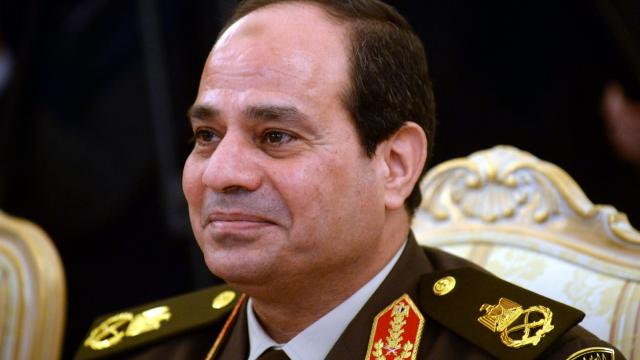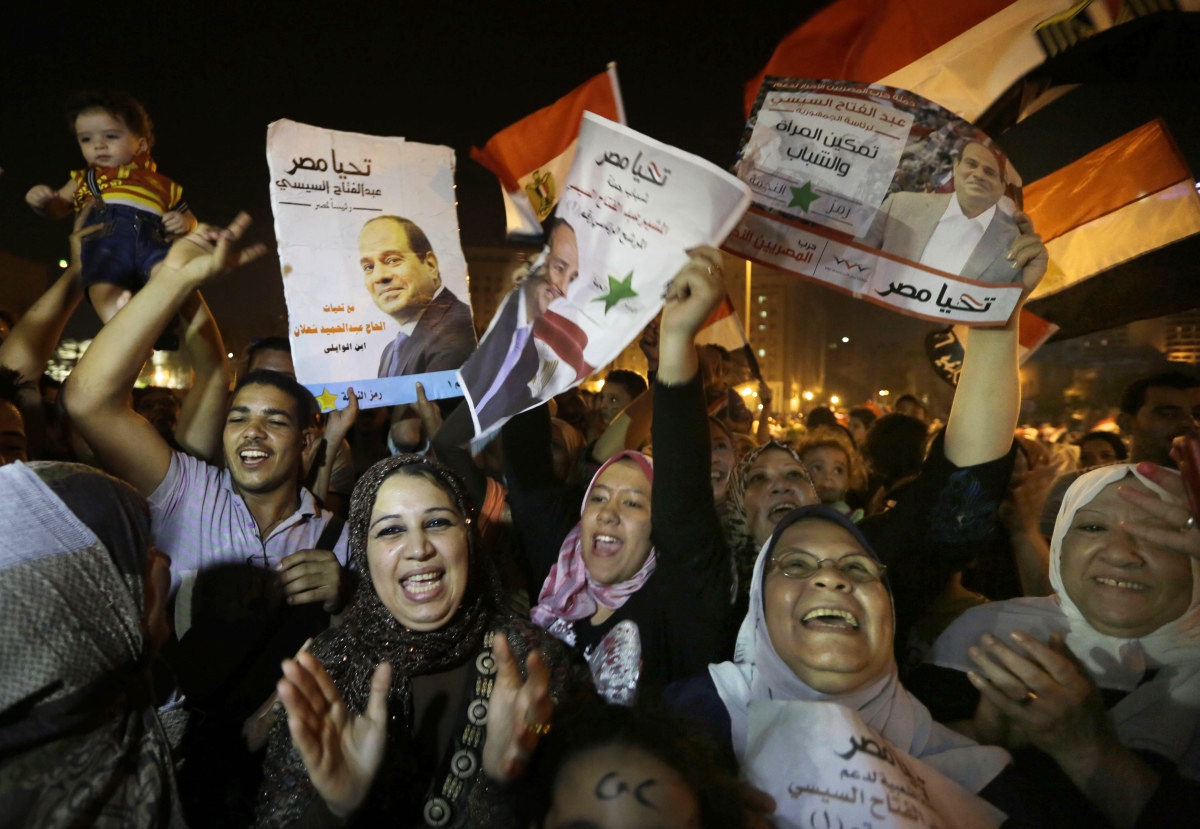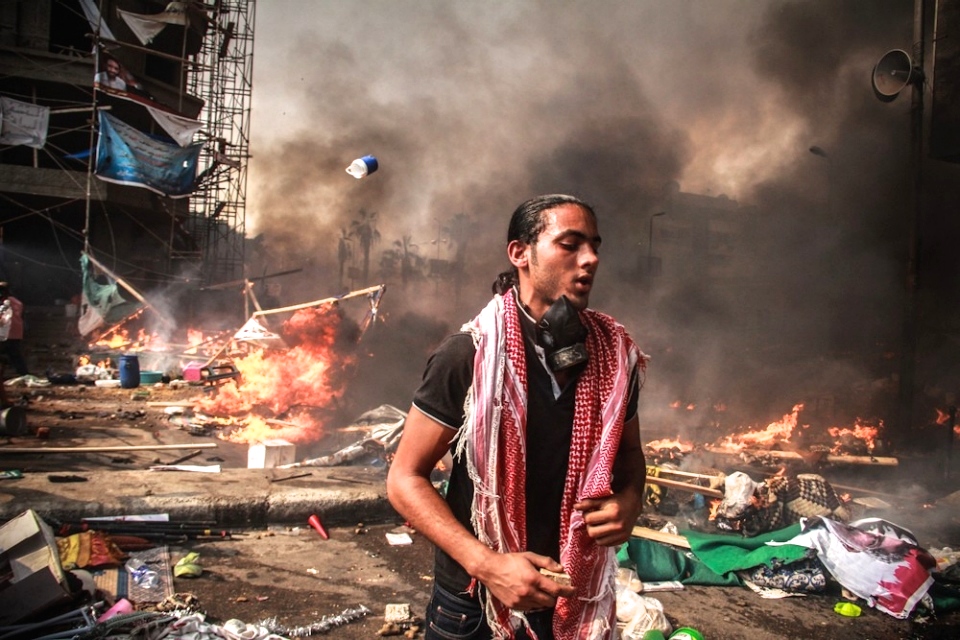
CAIRO – Many Egyptians are like Um Samah, a building guard in the capital's upscale neighborhood of Zamalek, who say newly announced President-elect Abdel Fattah al-Sisi can do no wrong even if he tried. To Um Samah, the former general is a national hero and savior.
That view is not only being voiced loudly these days in Egypt, but is being actively encouraged – because if one happens to think differently of the strong man slated to be the country's next president, one now runs the risk of being called anti-Egyptian. In public, al-Sisi has become a man you don't disagree with, but revere and look up to.
"His voice and face throw terror in the hearts of enemies," Um Samah says, referring to the outlawed Muslim Brotherhood and other dissidents, but also the supporters of losing opposition candidate Hamdeen Sabahi.
Across Zamalek and other Cairo neighborhoods, giant banners show a lion in the background with pictures of national heroes Gamal Abdel Nasser, Anwar el-Sadat and al-Sisi – while ousted presidents Hosni Mubarak and Mohamed Morsi, both in prison, remain noticeably absent.
The new era of al-Sisi was ushered in with mass street celebrations even hours before the voting polls closed last week.
On Tuesday, Egypt announced the expected results from its latest attempt at the democratic process, with former military chief al-Sisi garnering 96.9 percent of the vote in a landslide victory. Sabahi earned a reported 310,000 votes in polls which saw boycotts amid popular demands to end Egypt's single-player system.
The Election Committee said voter turnout was 47 percent.
"It's a historic moment for Egyptian history and for Arab nations' history," Karem Mahmoud, the head of al-Sisi's election campaign, told state TV.
Campaign Frustration
Late on May 27, which was supposed to be the final day of voting, the High Election Committee announced it was extending voting one additional day “due to high heat on the second day” in order to give more people a chance to cast their ballot.
Officially, the election results were supposed to be announced on June 5, but al-Sisi supporters felt confident enough to begin celebrations as the polls were closing. Underdog candidate Hamdeen Sabahi and his campaign were furious over the extension and threatened to pull out of the race.
His campaign said at the time that it believed voter turnout to be quite low, with estimates of around 30 percent of eligible voters – nearly 20 percent below the official final tally. By extending the election, Sabahi’s campaign argued it gave more time for al-Sisi to widen the margin.
But with less than five percent of the vote – at least officially – in his favor, the battle was an uphill one from the beginning.
Societal Discord
The election has once more polarized the country's people over the strain of politics, as families and friends fought over whom to vote for and why – with some relatives refusing to speak to one another if they didn’t agree on the candidate.
“I voted for Sisi not because I like him,” said Rana, a graduate in English literature, who declined to give her surname. “I voted for Sisi because I really hate the Brotherhood,” the group al-Sisi helped topple after tens of millions of Egyptians took to the streets on June 30, 2013, protesting the rule of then-President Mohamed Morsi.
But later, it was al-Sisi who led the round-up of tens of thousands of dissenters under a controversial Protest Law that established strict rules for public assembly and helped the military curtail public discord. The law reached a culmination with the removal of popular TV satirist Bassem Youssef, whose program Al-Bernamag captured the nation with its humorous criticisms of the military government.
Speaking at one of Cairo’s upscale cafes, where politics and the election were being discussed as young kids glanced at their iPhone for updates, Rana said that “many cannot even begin to imagine an Egypt where the Brotherhood would have any chance for taking over power."
"It was devastating to people,” she continued. “They pitted everyone against each other in the name of religion.”
The Brotherhood, which Rana and millions of other Egyptians despise, became the victims of an al-Sisi-led massacre after he ordered the military to dispel a largely peaceful sit-in by Morsi supporters who were demanding that the president be returned to power.
On August 13, 2013, the military stormed the popular square where thousands had camped out. The ensuing violence and death has been dubbed the Raba’a Square Massacre after 800 Brotherhood supporters were killed under government watch.
But Rana refused to discuss the incident. “Can’t you see the terror attacks they are doing now, or has the world forgot what happened at Ittihadiya?” she said, referring to the Brotherhood-led attack on protesters in December of 2012, when citizens were calling for the ouster of Morsi at the Presidential Palace, or Itahidiya. At least a dozen people were killed and hundreds injured in the overnight classes that saw the Brotherhood mobilize a well-armed attack.
The incident stoked fears in the Egyptian populace, which six months later took to the streets by the millions and brought Morsi down – paving the way for al-Sisi, the head of the military, to return to power.
Now, the elections have revealed stark, new divisions in Egyptian society as public criticism of al-Sisi becomes an “at your own risk” endeavor. In one publicized incident, a man at a photocopying shop became embroiled in a disagreement over politics and the election.
The young woman behind the desk disagreed with him on what she called his blind support for al-Sisi. Lashing out, the man responded by calling her “un-Egyptian."
“A vote for Sisi is a vote for Egypt," he told her, "and if you are not Egyptian then you should leave the country.”
As Egypt becomes increasingly fractured, and as politics continues to deepen its influence on people's daily lives, the election – and al-Sisi's ongoing victory celebrations – seems to have only heightened the tensions and frustrations that are brewing.
3 WAYS TO SHOW YOUR SUPPORT
- Log in to post comments













